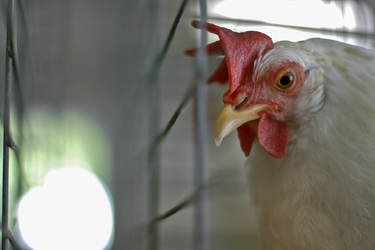Wide support for Altamont chicken law, but board action delayed
ALTAMONT — At the first public-hearing session for Altamont’s newly proposed chicken law, everyone who spoke about the bill was in favor of allowing chickens in the village, with critiques focused only on the law’s particulars.
Despite this, the public hearing will remain open, in part because a legal notice submitted by the village to The Enterprise was not published in time for the meeting, to the village board’s dismay.
“We’re going to continue and do the [State Environmental Quality Review] for this on Oct. 19, at six o’clock,” Mayor Kerry Dineen told the audience. “We didn’t want to wait until November. For one thing, we didn’t expect this to happen. We did not know it wasn’t printed in the paper, the notice. It was unfortunate. But we also have another … engineering project we want to talk about sooner than November, so it kind of worked out.”
At that time, she said, the board would accept additional new comments in addition to anyone who submits their thoughts in writing ahead of the meeting.
“We will then listen, close the public hearing that evening, and then we’ll do the SEQR part of this,” Dineen said of the Oct. 19 meeting, adding that those who spoke at the Oct. 3 public hearing were not obligated to show up again.
Hearing
Because the board had proactively asked for community members to demonstrate support for the law before drafting it — since an earlier attempt to pass a chicken law in 2019 was sidelined by a lack of residential support, but provided a foundation for the current law — it was no surprise that comments about the law were largely positive once the public hearing was officially open.
Megan Reis, a Berne-Knox-Westerlo student from Knox who raises chickens that she shows in Altamont, along with being involved in 4-H and Future Farmers of America, told the board that raising chickens is a good experience for young handlers, who learn responsibility from the “feathered puppies,” as she described them.
“They’re good at self-correcting your mistakes,” Reis said. “If their coop is too dirty, they’ll get sick or they’ll complain to you. They’re pretty cleanly animals … They’re also not even slightly loud — even the roosters.”
She said that a cockerel she once had was less loud than her neighbor’s dogs, and that, when chickens leave their pen, they’re typically eager to get back inside because they’re vulnerable to predators.
Plus, Reis said, chickens can be a financial benefit to families who either sell eggs or save themselves from buying eggs.
The draft law does not allow roosters nor the slaughter of hens.
Further, Reis said, adept handlers can win money in shows.
Altamont resident Maurice McCormick was concerned about when the building inspector would be allowed to inspect properties, believing that the law would grant the inspector 24/7 access. Board members explained to him that the building inspector works only six hours a week, and the law stipulates that he inspect properties during “reasonable daylight hours.”
McCormick also wanted more information on insulation requirements, which Dineen told him would be up to the building inspector. Later in the meeting, after some other people addressed problems they foresaw with typical foam insulation, the board agreed that the term “weatherization” would be more apt, since the board did not envision any particular type of weather protection for the chickens.
“Chickens are actually incredible at self-insulating,” Reis told the board. “Mine will walk outside perfectly fine in three-degree weather. I spoil them, so they have a heat lamp, and their coop is insulated; however, my other farmer friends know that the only real insulation the chickens need is walls, windows, and each other.”
Moisture, more than heat, tends to be the big problem in coops, since it can aid the development of parasites and disease, she explained.
John Polk, who said he was “very happy” that the law appeared to be moving forward, noted that it prohibits the scattering of feed on the ground, but felt like that provision would be difficult to enforce, and suggested to the board that members make it a recommendation rather than a prohibition.
Dineen said that the language was included because some people were reportedly concerned about loose feed attracting other animals.
“Can we actually babysit everybody 24/7 and hope they’re going to [follow it]?” Dineen said. “No, we can’t do that, but we put it in there because that’s our intent, to mitigate the things people brought to us.”
Reis returned again to tell the board that, while troughs can be useful, scattering feed should still be allowed since it provides the chickens with enrichment and health benefits. One chicken-raising blog points out that scattering food means that larger chickens are less able to bully smaller ones out of a meal than they are when food is contained to one area.
Altamont resident Kate Provencher said she felt that the 50-foot distance requirement from neighboring residences would unfairly restrict people who live in the village’s denser Zone 10, and that a 25- or 30-foot requirement would be more inclusive.
Dineen said that, at those nearer distances, people may run into trouble with neighboring dogs barking at chickens and wanted to avoid such situations, and also said, when asked, that variances can be obtained if the distance requirement can’t be met but neighbors are on board with living near a coop.
Kathy Glass told the board and those in attendance that she found the state’s Agriculture and Markets field veterinarian Amy Willsey to be very knowledgeable about chickens’ needs and “very accommodating” when it came to people calling and asking her questions.


